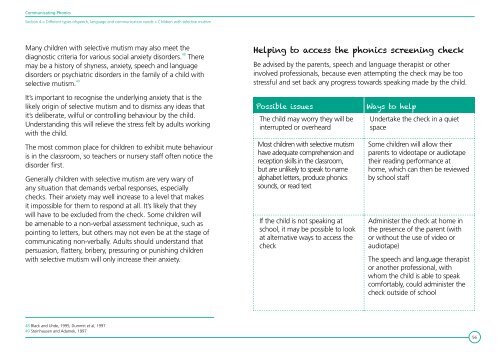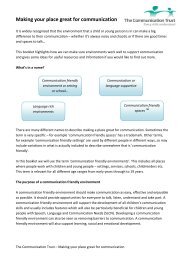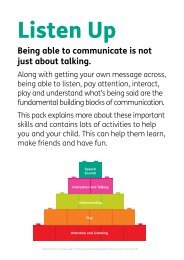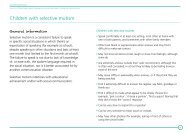Communicating Phonics - The Communication Trust
Communicating Phonics - The Communication Trust
Communicating Phonics - The Communication Trust
You also want an ePaper? Increase the reach of your titles
YUMPU automatically turns print PDFs into web optimized ePapers that Google loves.
<strong>Communicating</strong> <strong>Phonics</strong>Section 4 > Different types ofspeech, language and communication needs > Children with selective mutismMany children with selective mutism may also meet thediagnostic criteria for various social anxiety disorders. 48 <strong>The</strong>remay be a history of shyness, anxiety, speech and languagedisorders or psychiatric disorders in the family of a child withselective mutism. 49Helping to access the phonics screening checkBe advised by the parents, speech and language therapist or otherinvolved professionals, because even attempting the check may be toostressful and set back any progress towards speaking made by the child.It’s important to recognise the underlying anxiety that is thelikely origin of selective mutism and to dismiss any ideas thatit’s deliberate, wilful or controlling behaviour by the child.Understanding this will relieve the stress felt by adults workingwith the child.<strong>The</strong> most common place for children to exhibit mute behaviouris in the classroom, so teachers or nursery staff often notice thedisorder first.Generally children with selective mutism are very wary ofany situation that demands verbal responses, especiallychecks. <strong>The</strong>ir anxiety may well increase to a level that makesit impossible for them to respond at all. It’s likely that theywill have to be excluded from the check. Some children willbe amenable to a non-verbal assessment technique, such aspointing to letters, but others may not even be at the stage ofcommunicating non-verbally. Adults should understand thatpersuasion, flattery, bribery, pressuring or punishing childrenwith selective mutism will only increase their anxiety.Possible issues<strong>The</strong> child may worry they will beinterrupted or overheardMost children with selective mutismhave adequate comprehension andreception skills in the classroom,but are unlikely to speak to namealphabet letters, produce phonicssounds, or read textIf the child is not speaking atschool, it may be possible to lookat alternative ways to access thecheckWays to helpUndertake the check in a quietspaceSome children will allow theirparents to videotape or audiotapetheir reading performance athome, which can then be reviewedby school staffAdminister the check at home inthe presence of the parent (withor without the use of video oraudiotape)<strong>The</strong> speech and language therapistor another professional, withwhom the child is able to speakcomfortably, could administer thecheck outside of school48 Black and Uhde, 1995; Dummit et al, 199749 Steinhausen and Adamek, 199756
















